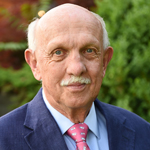The book, General George C. Marshall and the Atomic Bomb, looks at events of the first nuclear decade from General Marshall’s perspective. Marshall had the unique position of being the only high-level government official who participated in or witnessed the decisions regarding the production, use, and post-war management of the atomic bomb from 1942 to 1951.
My research for the book produced a number of interesting facts.
President Roosevelt had assigned management of the Manhattan Project to Marshall and the Army. Army Lt. Gen. Leslie Groves, the dynamic manager project, was not the first choice for the position and did not want it.
Army Chief of Staff Marshall’s testimony before Congress was instrumental in securing funds for the project. Congressmen trusted him when he said the funds were necessary but could not reveal their use.
Marshall and his staff suggested the “unconditional surrender” terms for Japan be modified, not negotiated, to allow the Emperor to remain on the throne. In addition to the possibility of avoiding further military action, it would assure elements of the Japanese armed forces surrender under the Emperor’s command. Ironically, the final terms of the surrender allowed the Emperor to remain under the control of the Supreme Allied Commander, General Douglas MacArthur.
Marshall was aware of the cost of war, not only through the steady list of casualties which crossed his desk, but through the loss of his stepson, LT Allan Tupper Brown, who was killed in 1944 in Italy by sniper fire.
It was not until August 14, five days after the second bomb devastated Nagasaki, when the Japanese surrendered that Marshall was sure an invasion of Japan would not be necessary.
NOTE: Dr. Settle recently talked at the Foundation regarding Marshall and the Atomic Bomb. Watch now:
This Week’s Guest Blogger: Frank Settle
 |
Frank A. Settle, Ph.D., professor emeritus of chemistry, Washington and Lee University and director of the ALSOS Digital Library for Nuclear Issues, was professor of chemistry at the Virginia Military Institute from 1964 to 1992. Before coming to W&L in 1998, he was a visiting professor at the U.S. Air Force Academy, a consultant at Los Alamos National Laboratory, and a program officer at the National Science Foundation. His new book, researched at the Marshall Library, General George C. Marshall and the Atomic Bomb will be published by Praeger in spring 2016. |
